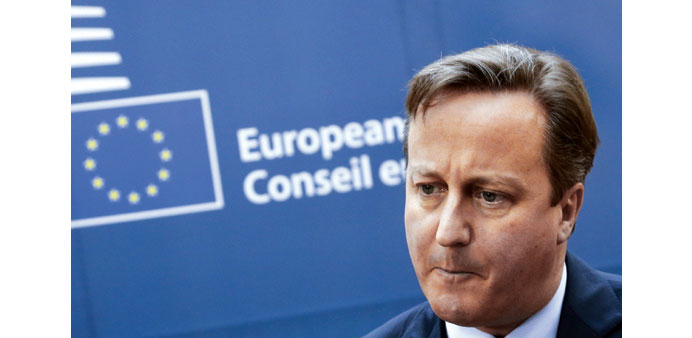Reuters/AFP
Brussels
Prime Minister David Cameron said yesterday that he hoped talks with European Union leaders would provide “real progress” towards a deal on better membership terms for Britain before a vote on staying in the bloc.
Other EU leaders, who will be meeting Cameron for dinner in Brussels, want to help him ensure Britain votes to stay in the EU in a referendum due within two years, with opinion polls showing the number of Britons wishing to leave is growing.
But Cameron faces an uphill struggle to win agreement on curbing welfare payments to EU migrants to try to reduce immigration, a proposal some leaders, especially from eastern Europe say breaks the fundamental EU principles.
“Tonight, here in Brussels, we are going to have a conversation dedicated to Britain’s renegotiation of its position in Europe and I want to see real progress in all of the four areas that I have mentioned,” he told reporters on arrival, referring to four topics on which he wants to negotiate change. “We’re not pushing for a deal tonight but we’re pushing for real momentum so that we can get this deal done. So I will be battling for Britain right through the night and I think we’ll be getting a good deal.”
Cameron says he wants Britain to stay in the EU, but has promised to campaign for an exit from the bloc if he fails to win an agreement that can reduce immigration, improve business competitiveness in the EU, give more sovereignty back to Britain and protect London’s banks from interference by the eurozone.
But his proposal to make immigrants from the other 27 EU states wait four years before claiming “in-work” benefits in Britain – payments to people in lower paid jobs to make work more attractive – has been roundly criticised, especially in eastern Europe, for breaking EU law banning discrimination.
Poland, Hungary, Slovakia and the Czech Republic, known as the Visegrad Group, said in a statement that they would reject any British demand to change EU laws that would mean discrimination against their citizens or limit their freedom of movement.
For many Europeans born behind the Iron Curtain, that freedom is a touchstone of their post-Cold War liberation.
A British official said Cameron was offering no alternatives to his four-year proposal at the summit, but the prime minister was eager to hear whether other leaders had other suggestions that would help control immigration to Britain better.
Drawing the European Union’s focus to a small part of Britain’s welfare system has raised eyebrows among some leaders who are trying to hammer out a deal to house hundreds of thousands of refugees and respond to a war in Syria.
But EU officials said most were keen to help Cameron return to Britain with a message that he is winning in the talks, to turn the tide of opinion polls which suggest that those wanting to leave, or the “out” camp, were gaining ground.
“There’s a certain orchestration to make sure that tonight things work out well for David Cameron, to make it look as that he is winning, because no one wants a Brexit,” a senior official close to the talks said.
Despite the goodwill, the difficulties of securing any agreement on welfare looked a way off.
German Chancellor Angela Merkel said she expected EU leaders to have an open discussion, but “at the same time do not want to limit the basic liberties, non-discrimination, free movement, of the European Union”.
French President Francois Hollande agreed, saying that it would “not be acceptable to revise the very foundations of European commitments”, while a source close to the talks put it bluntly: “There’s going to have to be a lot of creative thinking.”
European Council President Donald Tusk added that “some parts of the British proposal seem unacceptable” while European Commission President Jean-Claude Juncker urged Cameron to come up with alternatives.
“We want a fair deal with Britain but this fair deal with Britain has to be a fair deal for the other 27 too,” Juncker said.
Some governments, notably eurozone powerhouse Germany, are also uncomfortable with Cameron’s demand for Britain to be safeguarded from any move by the 19 countries that share the euro currency to impose rules by majority vote on the City.
Cameron has been touring capitals to drum up support for demands that he says will soothe British fears over the EU and help convince people to stay in the bloc.
A British government official said that he would hold bilateral talks with his Lithuanian and Greek counterparts before the dinner.
The British government hopes the dinner will signal a political will to accelerate more technical talks on how London’s demands can be made legally watertight in the EU to try to reach agreement in February, at another EU summit.
An agreement early next year could give Cameron enough time to stage the referendum in June, seen by some analysts as an advantageous time before summer.
That is when migrants fleeing conflict and poverty in Africa and the Middle East may start making the treacherous journey to Europe, images that have fuelled fears about rising immigration in Britain – even though Britain is not part of Europe’s open-border Schengen zone, through which migrants have been moving.
“The aim will be to have this substantive political discussion on Thursday evening, looking at the progress made so far and in particular looking at some of the more difficult and trickier areas to resolve,” the British official said.

Cameroon: I think we’ll be getting a good deal.
